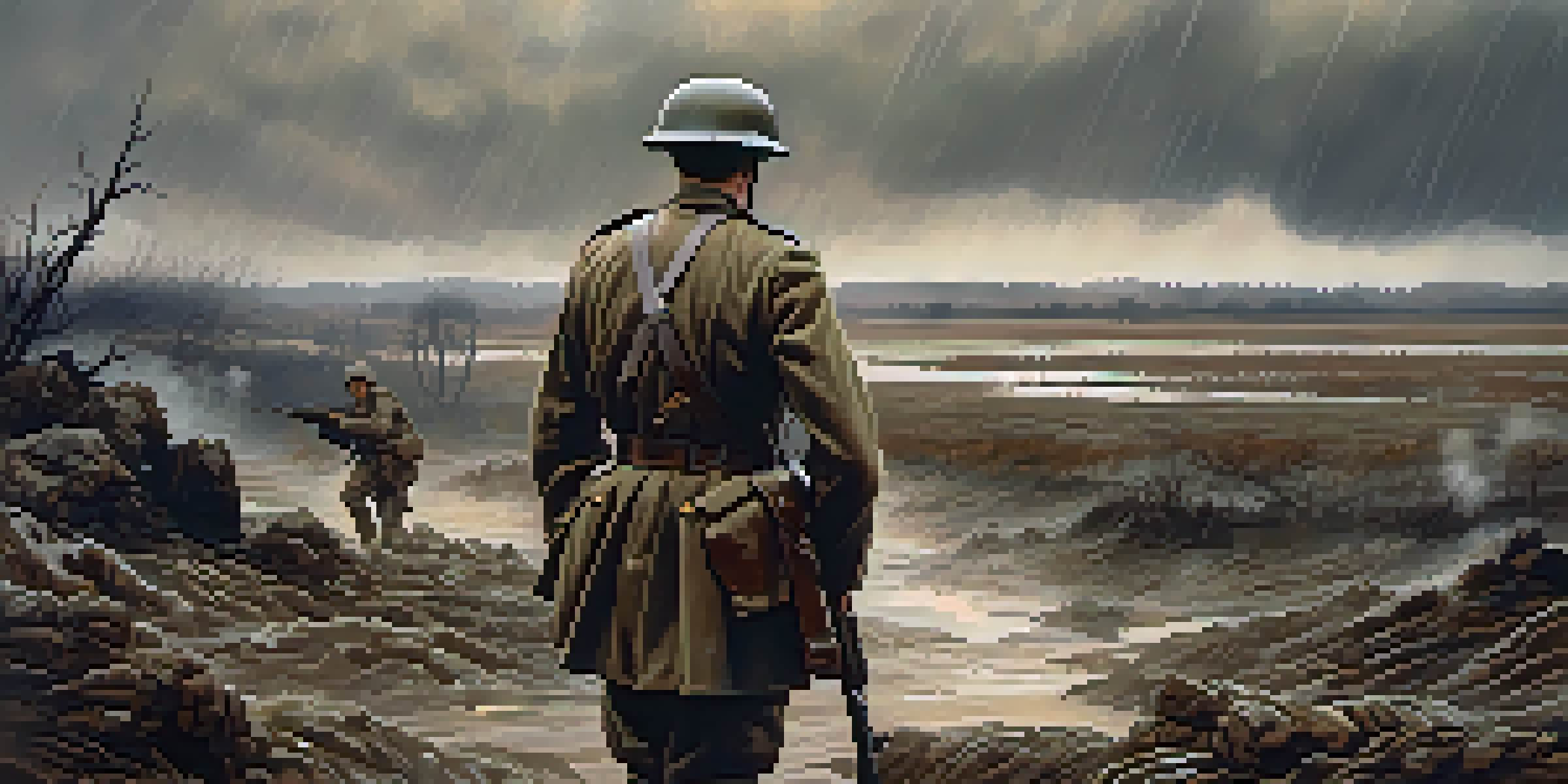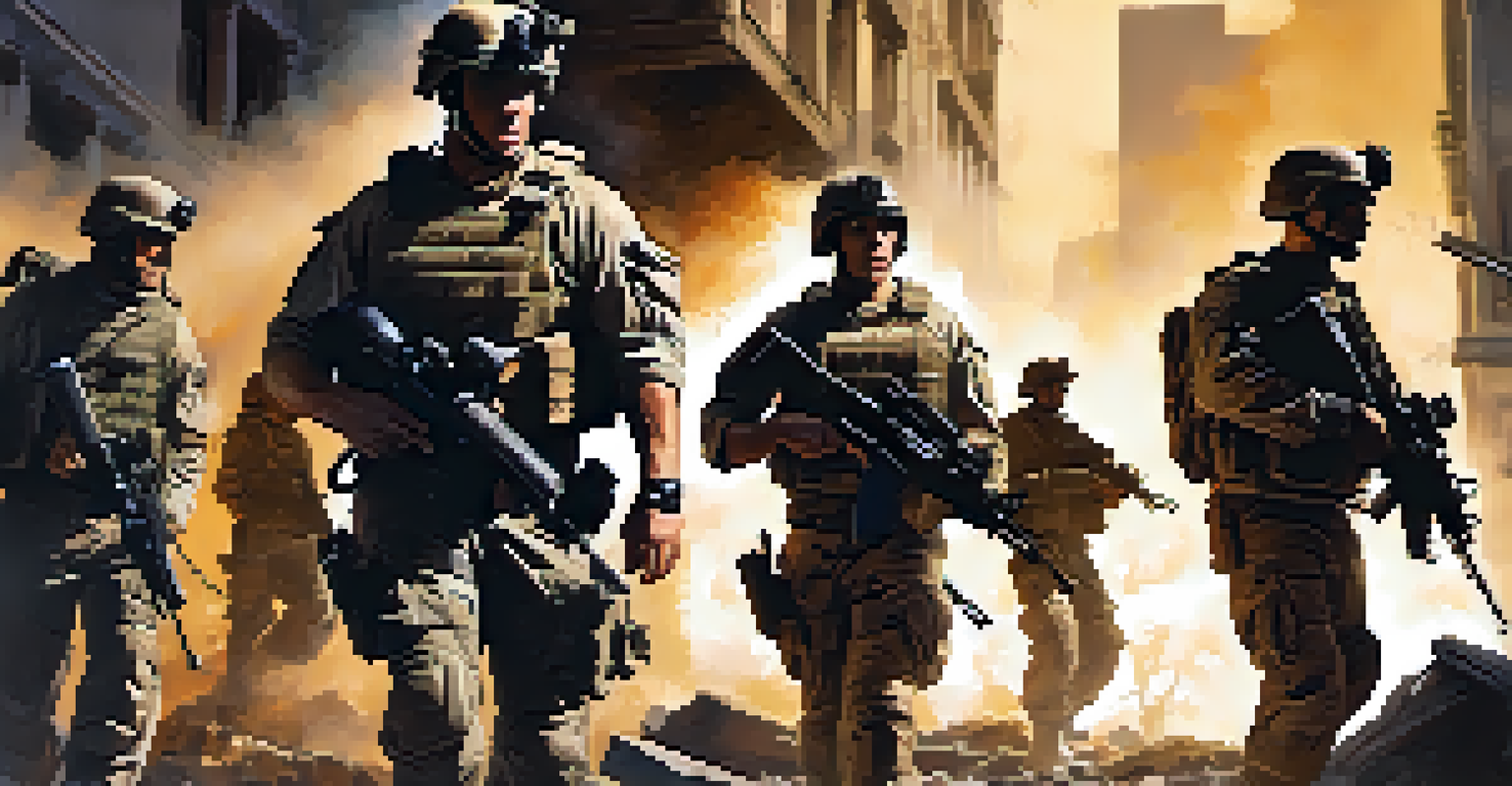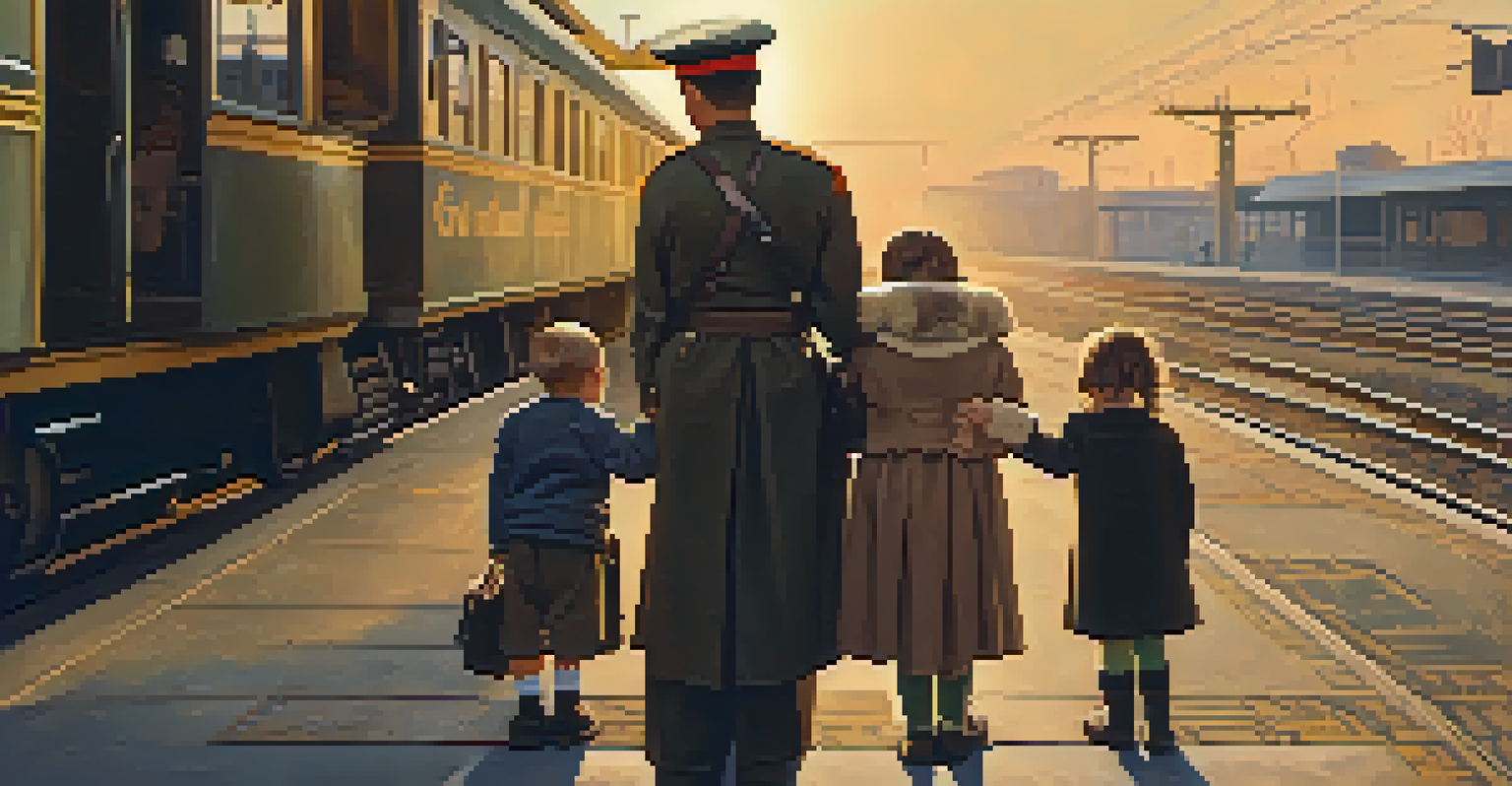The Impact of War Films on National Identity and Morale

Understanding the Relationship Between War Films and Identity
War films often serve as a mirror reflecting a nation's values and beliefs. They encapsulate the struggles and triumphs of a country, portraying its history in a way that resonates with audiences. For many, these films can evoke feelings of pride, nostalgia, or even reflection on past mistakes.
Cinema is a mirror by which we often see ourselves.
The narratives presented in war films can solidify a sense of belonging among viewers. By showcasing shared experiences, whether heroic or tragic, they create a collective memory that bonds individuals to their nation. This shared identity can be especially powerful during times of conflict or uncertainty.
Moreover, the portrayal of national heroes and values in these films shapes how citizens perceive their own identity. Characters embodying courage, sacrifice, and resilience become symbols of what it means to be part of that nation, influencing public perception and morale.
War Films as Tools for Propaganda and Recruitment
Throughout history, governments have utilized war films as propaganda tools to shape public opinion. By glorifying military efforts and presenting a unified front, these films can rally support for wars and military initiatives. This manipulation of narrative can often skew perceptions of conflict, portraying it as noble or necessary.

Recruitment efforts have also heavily relied on war films to inspire young individuals to enlist. Action-packed scenes and heroic portrayals can romanticize military life, making it appealing to potential recruits. This strategy has been evident in various films that highlight camaraderie and adventure, tapping into a sense of duty and patriotism.
War Films Reflect National Identity
War films mirror a nation's values and beliefs, fostering a sense of belonging and collective memory among viewers.
However, it's essential to recognize the ethical implications of such portrayals. While they can boost morale and enlistment, they may also gloss over the harsh realities of war, leading to a distorted understanding of its consequences.
The Emotional Impact of War Films on Audiences
War films have a unique ability to evoke strong emotions in viewers, often leading to a deeper connection with the subject matter. Scenes of loss, bravery, and sacrifice can resonate on a personal level, stirring feelings of empathy and understanding. This emotional engagement can significantly influence public sentiment regarding war.
The only thing we have to fear is fear itself—and war films can sometimes amplify that fear, shaping public perception in ways we may not even realize.
Many people find themselves reflecting on their own values and beliefs after watching such films. Questions about morality, honor, and the cost of conflict often arise, prompting discussions in homes and communities. This introspection can lead to a more informed populace, better equipped to engage in meaningful dialogue about national issues.
Additionally, the cathartic experience of watching war films can help individuals process their feelings about real-world conflicts. For veterans and families affected by war, these films can serve as a means of coping, offering a space to explore their emotions and experiences.
Cultural Narratives and Their Evolution in War Films
The portrayal of war in films has evolved alongside societal changes and cultural narratives. Earlier films often depicted clear distinctions between good and evil, creating black-and-white scenarios that resonated with simpler understandings of conflict. However, as society has progressed, so too has the complexity of these narratives.
Modern war films frequently challenge traditional notions of heroism and villainy. They explore the gray areas of morality, presenting characters with conflicting motivations and consequences. This shift reflects a broader understanding of the complexities of war and encourages viewers to think critically about the narratives they consume.
Propaganda and Recruitment Tools
Governments have historically used war films as propaganda to shape public opinion and encourage military enlistment.
As cultural attitudes continue to evolve, war films will likely adapt, reflecting contemporary values and concerns. This ongoing transformation can lead to more inclusive representations of diverse experiences, enhancing national identity by acknowledging the multifaceted nature of conflict.
The Role of War Films in Shaping Public Morale
War films can play a crucial role in shaping public morale, particularly during challenging times. They can provide a sense of hope and resilience, reminding viewers of their nation's strength and unity. By highlighting stories of sacrifice and triumph, these films can uplift spirits and foster a sense of collective purpose.
Conversely, war films can also reflect the anxieties and fears of a nation. When conflicts seem insurmountable, films that delve into the darker aspects of war can resonate deeply, prompting discussions about peace and reconciliation. This duality underscores the power of cinema in influencing public sentiment.
Ultimately, war films have the potential to both inspire and challenge audiences, making them a significant aspect of national identity and morale. By engaging with these narratives, viewers can better understand their place within the larger story of their country.
Exploring the Global Impact of War Films
The influence of war films extends beyond national borders, shaping global perceptions of conflict. International audiences often interpret these films through their cultural lens, leading to diverse understandings of the same narrative. This cross-cultural exchange can foster dialogue and empathy, bridging gaps between nations.
Moreover, the portrayal of specific conflicts can affect international relations. Films that depict a nation's military actions or decisions can sway public opinion abroad, influencing how foreign populations view that country. This impact highlights the responsibility filmmakers have in crafting narratives that resonate across cultures.
Emotional Engagement with Audiences
The emotional depth of war films can lead to personal reflection and discussions about morality, honor, and the realities of conflict.
As global connectivity increases, the reach of war films is likely to expand, further complicating their role in shaping identity and morale on an international scale. Understanding this impact can help audiences navigate the complexities of representation in a globalized world.
The Future of War Films in a Changing World
As society evolves, so too will the themes and narratives explored in war films. Issues such as social justice, mental health, and the consequences of conflict are becoming increasingly relevant, prompting filmmakers to approach these topics with sensitivity and depth. This shift could lead to more nuanced portrayals of conflict, challenging traditional narratives.
Advancements in technology also play a significant role in the evolution of war films. With the rise of virtual reality and immersive storytelling, audiences may experience conflicts in ways that were previously unimaginable. This innovation can deepen emotional engagement and foster a greater understanding of the complexities of war.

Ultimately, the future of war films will likely be shaped by the ongoing dialogue between filmmakers, audiences, and the realities of the modern world. As these narratives continue to evolve, they will undoubtedly contribute to the ongoing discourse surrounding national identity and public morale.